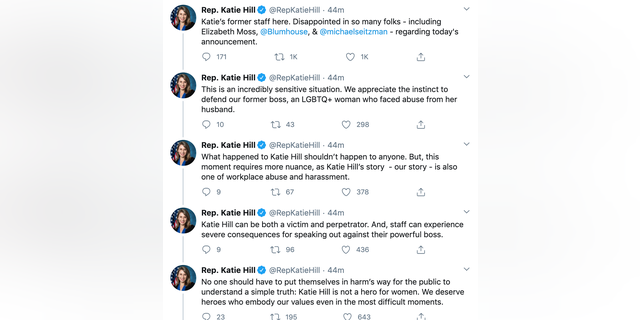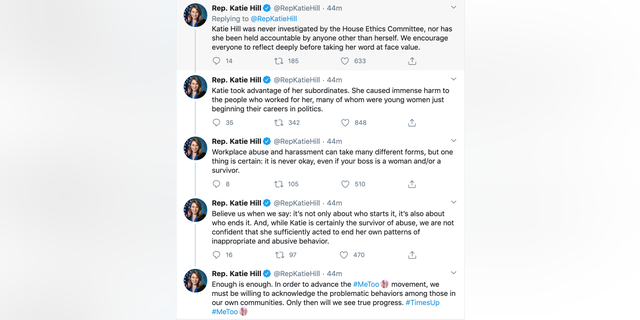President Trump on Tuesday said he has “fully authorized the total Declassification of any & all documents" related to the Russia investigation and the FBI’s investigation into former Secretary of State Hillary Clinton’s use of a private email server.
“I
have fully authorized the total Declassification of any & all
documents pertaining to the single greatest political CRIME in American
History, the Russia Hoax. Likewise, the Hillary Clinton Email Scandal.
No redactions!” The president tweeted Tuesday night.
"All Russia
Hoax Scandal information was Declassified by me long ago," Trump
tweeted. "Unfortunately for our Country, people have acted very slowly,
especially since it is perhaps the biggest political crime in the
history of our Country."
He added: "Act!!!"
Last year, the president gave Attorney General Bill Barr authority to declassify any documents
related to surveillance of the Trump campaign in 2016. Trump, at the
time, also ordered members of the intelligence community to cooperate
with Barr’s probe.
Allies of the president, including
Republicans on Capitol Hill leading their own investigations into the
origins of the Trump-Russia probe, have criticized officials like FBI
Director Christopher Wray and CIA Director Gina Haspel, claiming that
the directors have been blocking the release of documents.
The
president’s tweets come after Director of National Intelligence John
Ratcliffe declassified documents that revealed former CIA Director John
Brennan briefed former President Obama on Hillary Clinton’s purported
“plan” to tie then-candidate Donald Trump to Russia as “a means of
distracting the public from her use of a private email server” ahead of
the 2016 presidential election.
Fox
News first reported that Ratcliffe declassified Brennan’s handwritten
notes – which were taken after he briefed Obama on the intelligence the
CIA received – and a CIA memo, which revealed that officials referred
the matter to the FBI for potential investigative action.
"Today,
at the direction of President Trump, I declassified additional documents
relevant to ongoing Congressional oversight and
investigative activities," Ratcliffe said in a statement to Fox News
Tuesday.
A source familiar with the documents explained that Brennan's handwritten notes were taken after briefing Obama on the matter.
“We’re
getting additional insight into Russian activities from [REDACTED],”
Brennan notes read. “CITE [summarizing] alleged approved by Hillary
Clinton a proposal from one of her foreign policy advisers to vilify
Donald Trump by stirring up a scandal claiming interference by the
Russian security service,” Brennan’s notes read.
The notes state “on 28 of July." In the margin, Brennan writes "POTUS," but that section of the notes is redacted.
“Any evidence of collaboration between Trump campaign + Russia,” the notes read.
The remainder of the notes are redacted, except in the margins, which reads: “JC,” “Denis,” and “Susan."
The
notes don't spell out the full names but "JC" could be referring to
then-FBI Director James Comey, "Susan" could refer to National Security
Adviser Susan Rice, and "Denis" could refer to then-Obama chief of staff
Denis McDonough.
The declassification comes after Ratcliffe, last
week, shared newly-declassified information with the Senate Judiciary
Committee which revealed that in September 2016, U.S. intelligence
officials forwarded an investigative referral on Hillary Clinton
purportedly approving “a plan concerning U.S. presidential candidate
Donald Trump and Russian hackers hampering U.S. elections” in order to
distract the public from her email scandal.
That referral was sent to Comey and then-Deputy Assistant Director of Counterintelligence Peter Strzok.
“The
following information is provided for the exclusive use of your bureau
for background investigative action or lead purposes as appropriate,”
the CIA memo to Comey and Strzok stated.
"This memorandum contains
sensitive information that could be source revealing. It should be
handled with particular attention to compartmentation and need-to-know.
To avoid the possible compromise of the source, any investigative action
taken in response to the information below should be coordinated in
advance with Chief Counterintelligence Mission Center, Legal,” the memo,
which was sent to Comey and Strzok, read. “It may not be used in any
legal proceeding—including FISA applications—without prior approval…”
“Per
FBI verbal request, CIA provides the below examples of information the
CROSSFIRE HURRICANE fusion cell has gleaned to date," the memo
continued. "“An exchange [REDACTED] discussing US presidential candidate
Hillary Clinton’s approval of a plan concerning US presidential
candidate Donald Trump and Russian hackers hampering US elections as a
means of distracting the public from her use of a private email server.”
The memo is heavily redacted.
Ratcliffe
informed the committee last week that the Obama administration obtained
Russian intelligence in July 2016 with allegations against Clinton, but
cautioned that the intelligence community “does not know the accuracy
of this allegation or the text to which the Russian intelligence
analysis may reflect exaggeration or fabrication.”
According to
Ratcliffe’s letter, the intelligence included the “alleged approval by
Hillary Clinton on July 26, 2016, of a proposal from one of her foreign
policy advisers to vilify Donald Trump by stirring up a scandal claiming
interference by Russian security services.”
Nick Merrill,
Clinton's spokesperson, called the allegations "baseless b———t” last
week. A spokesman for Clinton did not immediately respond to Fox News’
request for comment on the declassified documents.
But Ratcliffe,
in a statement released after the information was made public, pushed
back on the idea he was advancing "Russian disinformation.”
"To
be clear, this is not Russian disinformation and has not been assessed
as such by the Intelligence Community,” Ratcliffe said in a statement to
Fox News. “I’ll be briefing Congress on the sensitive sources and
methods by which it was obtained in the coming days.”
A source familiar with the documents told Fox News on Tuesday that the allegation was "not disinformation.”
"This
is not Russian disinformation. Even Brennan knew, or he wouldn't be
briefing the president of the United States on it," the source said.
"There is a high threshold to orally brief the president of the United
States and he clearly felt this met that threshold.”
Another
source familiar with the documents told Fox News that "this information
has been sought by hundreds of congressional requests for legitimate
oversight purposes and was withheld for political spite—and the belief
that they’d never get caught.”
The source added that the Brennan notes are significant because it is “their own words, written and memorialized in real time.”
Meanwhile,
last week, during a hearing before the Senate Judiciary Committee,
Comey was asked whether he received an investigative referral on Clinton
from 2016, but he said it didn’t “ring any bells.”
“You don’t
remember getting an investigatory lead from the intelligence community?
Sept. 7, 2016, U.S. intelligence officials forwarded an investigative
referral to James Comey and Strzok regarding Clinton’s approval of a
plan [about] Trump…as a means of distraction?” Graham asked Comey.
“That doesn’t ring any bells with me,” Comey said.
Graham
questioned “how far-fetched is that,” citing the fact that Clinton
campaign and the Democratic National Committee, through law firm Perkins
Coie, hired Fusion GPS and ex-British intelligence officer Christopher
Steele to author and compile information for the controversial and
unverified anti-Trump dossier.
The Clinton campaign and the
Democratic National Committee, through law firm Perkins Coie, hired
Fusion GPS and ex-British intelligence officer Christopher Steele to
author and compile information for the controversial and unverified
anti-Trump dossier.
The dossier contains claims about alleged ties
between Donald Trump and Russia that served as the basis for Foreign
Intelligence Surveillance Act (FISA) warrants obtained against former
Trump campaign aide Carter Page.
Attorney General Bill Barr last year appointed U.S. Attorney of Connecticut John Durham to investigate the origins of the FBI’s Russia probe shortly
after special counsel Robert Mueller completed his years-long
investigation into whether the campaign colluded with the Russians to
influence the 2016 presidential election.
It is unclear whether
this information will be considered part of Durham’s investigation, or
whether the president’s declassification will affect Durham’s
investigation.
Last month, Fox News reported, though, that Durham had assumed aspects of U.S. Attorney John Huber’s investigation into the Clinton Foundation.
A
source familiar with Durham’s investigation told Fox News last month
that parts of what Huber was investigating in 2017 -- involving the Clinton Foundation -- have been incorporated in Durham’s investigation.
In
November 2017, then-Attorney General Jeff Sessions directed Huber, the
U.S. attorney for Utah, and other senior prosecutors to evaluate
“certain issues” involving the sale of Uranium One, and other dealings
related to the Clinton Foundation. Sessions tapped Huber after requests
by congressional Republicans, who had been calling for the appointment
of a special counsel to review the matters.
Huber was also tasked
with reviewing the FBI’s handling of the Clinton email probe, including
allegations that the Justice Department and FBI “policies or procedures”
were not followed.
It has been unclear, for years, the status of
Huber's investigation, but another source told Fox News Thursday that
Huber has faced mounting criticism from the Justice Department and White
House over his progress.
It is unclear whether any aspects of the Clinton email investigation were included in Huber’s review.






















